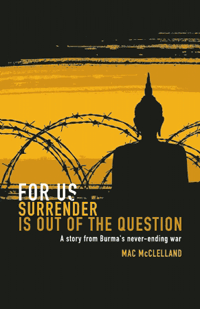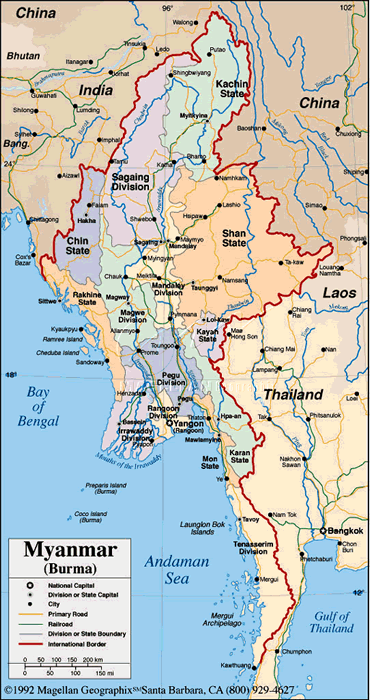Ilankai Tamil Sangam28th Year on the Web Association of Tamils of Sri Lanka in the USA |
|||
 Home Home Archives Archives |
'For Us Surrender is Out of the QuestionA story of Burma’s never-ending war'Book review by Avis Sri-Jayantha, December 20, 2010
For Us Surrender is Out of the Question By Mac McClelland Soft Skull Press, NY Paper | 5 1/2 x 8 1/4 | 304 pgs. | ISBN: 1-59376-265-8 | List: $15.95 | 03/1/2010 McClelland’s memoir of her time volunteering for a Karen refugee human rights organization in Thailand has much to teach Sri Lankan Tamils and is an enjoyable read besides. The parallels and divergences between the situation of the Karens and the Tamils tells us much about international politics that we need to know.
Burma is the first country that Sri Lanka’s Pres. Rajapakse visited following his victory over the LTTE in May, 2009. This should alert us to Burma’s importance if nothing else. Burma perhaps taught Rajapakse that all-out war on a population can destroy their resistance, while Sri Lanka is probably teaching Burma the tools for setting up a sham democracy that will lull those who care about forms of government, if perhaps not their substance. Sharing Theravada Buddhism and a rapacious colonial past probably makes communication easier. The history of the Karen people in Burma is disconcertingly familiar in many respects. What is different is the relationship of the country and its various peoples with the rest of the world.
McClelland also talks about US sanctions and their flaws that permitted Burma’s government to earn $1 billion from Chevron in 2008. “We know well enough to know that as long as there’s money—and energy—to be made in Burma, there’s unlikely to be a cohesive or constructive policy of international financial disengagement.” (p.193)
In 2009, fifty US congressmen signed a letter urging Pres. Obama to lobby for a UN Security Council commission to examine crimes against humanity in Burma.(p.200) The Genocide Prevention Task Force, headed by Madeleine Albright, “put Burma on the genocide watch list, not that watching has ever been a particularly effective form of assistance to people on the business end of a genocide.” (p.312) Sadly, after a long list of atrocities and international ineffectiveness, McClelland says:
Once Burma’s ruling military junta, which presides over a force of 350,000 (p.8) in a country of over 50 million, managed to organize a group to break away from the Karen National Union army (the KNLA) based on religious differences in 1994 (p.84), a 1995 all-out assault was launched on the Karen separatist administrative center, destroying it and most of the Karen army. A buying spree in China facilitated the campaign. Four Cuts, a counter-insurgency program aimed at cutting the links between the population and the insurgents through a scorched earth policy, proved successful at weakening the insurgents with devastating consequences for the civilian population. Forced relocation into military-controlled camps, destruction of villages, forced labor, systematic rape, free-fire zones, etc. have all been used against the Karen. Even so, the military now spend 20-30% of their budget on intelligence gathering amongst their own population. (p.163) Interestingly, the KNU seems not to have been placed on the US State Dept. FTO list, but was designated a terrorist organization under the Immigration and Nationality Act, which meant that refugees could not seek asylum in the US if they had provided any form of support for the KNU. This designation was revoked in 2008. Western hostility to the Burmese regime does provide an noteworthy counterpoint to our experience, since McClelland is one of many Western volunteers and NGOs in Thailand, helping a population that deservedly provokes sympathy. There it is possible for her to intimately get to know people her age working to document the atrocities against their people and provide pride and leadership to people beaten into submission. She admires their pluck and persistence, while not having to worry about being called a ‘T’ word. Isn’t geopolitics wonderful? There have only been a rare few souls who have come to know the Tamils of Sri Lanka from such a perspective out of fear of the ‘T’ word and lack of access, and none have certainly yet written such an accessible book. The only one of this type that comes to mind is “Learning Politics from Sivaram” by Dr. Mark Whitaker. http://www.sangam.org/2007/10/Sivaram_C-I_1.php Interesting fact: The Rambo movie series is based on Burma, with John Rambo rescuing kidnapped missionaries in Karen state from the brutal regime in the 2008 movie. If I had a criticism of the book it is that McClelland makes us care about the people she gets to know during her visit to Thailand, but rather drops them abruptly when they arrive in the US. We all know that life goes on in the diaspora and that this is just as much a story as what happens on the other side of the ocean. Also disconcerting is that there is no Table of Contents. There are notes on each chapter, but they are not linked to the text as footnotes, I assume because McClelland thought all those footnotes would interfere with readability. McClelland does make an issue of the difficulty of fact-checking re a country where every fact, even ones like trade flows and child mortality, are contested. Unfortunately, she does not go far enough into how the manipulation of facts is an important political tool. In Sri Lanka, for instance, the UN’s numbers did not include the northeast, so that socioeconomic data look good and put Sri Lanka well above its peers on such standards as infant mortality. Collective crimes such as crimes against humanity and genocide are much easier to hide if no one is measuring.
| ||
 McClelland’s tale is fun because it is a classic tale of Pampered Westerner Meets Third World realities. “Yes, Mac, the world is much stranger and more amazing than we ever imagined!” We can all relate to riding on a motorcycle in crazy traffic, worrying about mosquito bites in the tropics, and meeting people whose life experience is radically different from ours. In addition, McClelland is such a good writer that she really makes us care about the people she introduces us to and the history that she teaches us during her adventures.
McClelland’s tale is fun because it is a classic tale of Pampered Westerner Meets Third World realities. “Yes, Mac, the world is much stranger and more amazing than we ever imagined!” We can all relate to riding on a motorcycle in crazy traffic, worrying about mosquito bites in the tropics, and meeting people whose life experience is radically different from ours. In addition, McClelland is such a good writer that she really makes us care about the people she introduces us to and the history that she teaches us during her adventures. 